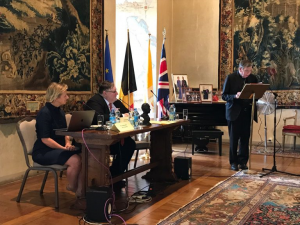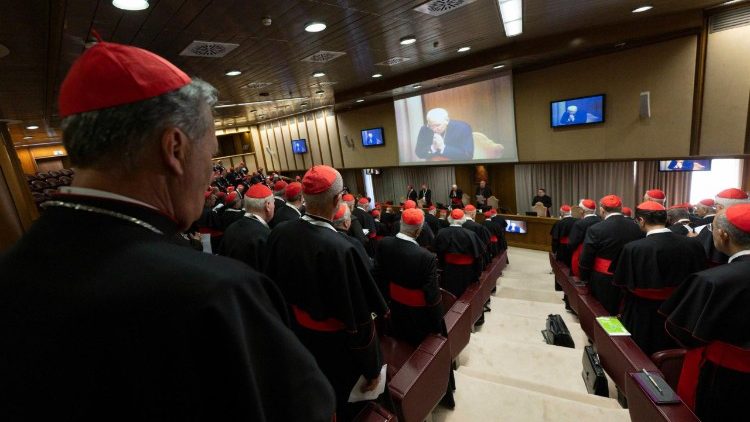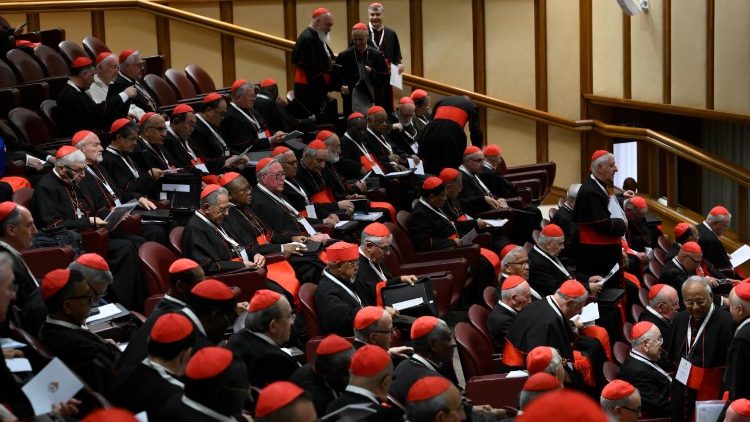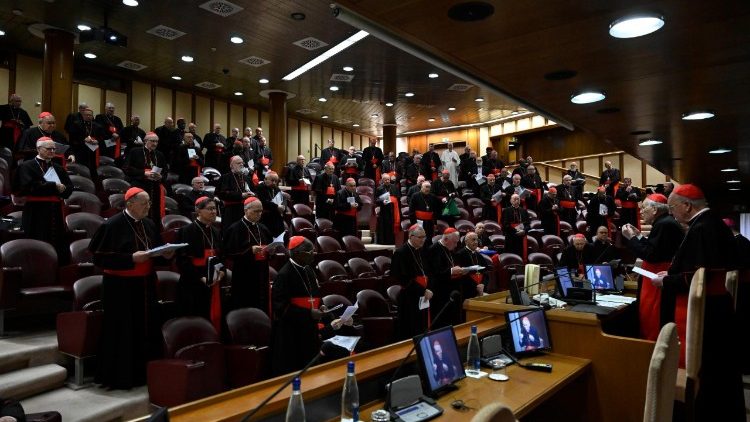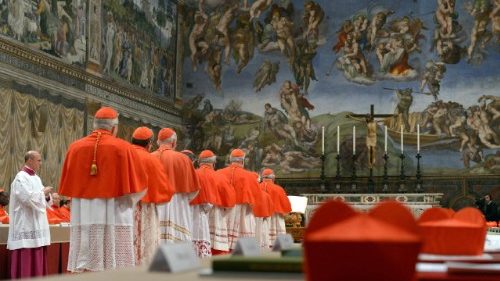Welcoming cardinals from the Vatican and abroad, as well as the former Archbishop of Canterbury, the widely-anticipated seminar “The Malines Conversations 100 Years On” was a thought-provoking ecumenical engagement.
Co-hosted by the Belgian and British Ambassadors to the Holy See, Patrick Renault and Sally Axworthy, respectively, Exaudi participated in the Symposium at the Belgian Ambassador’s Residence in the Parioli quarter of Rome on June 11, 2021.
Following a resolution of the Lambeth conference in 1920, contacts were made between members of the Anglican Church, including Lord Halifax and the Archbishop of York, and Cardinal Mercier, Archbishop of Malines and Primate of the Catholic Church in Belgium. Between 1921 and 1927 Cardinal Mercier, and his successor, Cardinal van Roey, hosted five private conversations between Anglicans and Catholics on whether the two Churches should be reunited.
Cardinal Kurt Koch, the President of the Pontifical Council for Promoting Christian Unity; Cardinal Josef De Kesel, Archbishop of Mechelen-Brussels, Belgium; and His Grace Archbishop Rowan Williams, Welsh Anglican bishop, theologian and poet, who served as Archbishop of Canterbury (2002-2012), were the panel speakers on Friday, along with other illustrious participants.
‘Pioneer’ Initiatives ‘Cannot Be Forgotten’
The Malines conversations resulted in intensification of the Week of Prayer for Christian Unity and ultimately in the visit of the Archbishop of Canterbury, Michael Ramsay, to Pope Paul VI in 1966, and the start of the institutional dialogues, the Anglican Roman Catholic International Commission (ARCIC) in 1970 and the International Anglican-Roman Catholic Commission for Unity and Mission (IARCCUM) in 2001.
In his opening remarks, Cardinal De Kesel noted it was a “privilege” and “joy” to address those present, while simultaneously apologizing for not being physically present due to illness. While anticipating that later this year, the centenary would be celebrated in Malines, he thanked both ambassadors for doing so already in Rome.
The Belgian Cardinal stressed why, in his view, the Malines Conversations “cannot be forgotten.”
“The initiatives taken by Lord Halifax, Cardinal Mercier and Father Portal,” he recalled, “were those of pioneers, and at a time that it was anything but self evident.”
While acknowledging that the Lambeth Conference did make in July 1920 an “appeal to all Christian people for unity” and that this certainly must have motivated Cardinal Mercier to respond to Lord Halifax’s entreaty, he however pointed out: “As far as the Church’s official stance was concerned, the attitude remained pronouncedly reserved in particular on the Catholic side.”
“Only subsequent to the Second Vatican Council,” he highlighted, “did the door truly open, leading to an official dialogue.” He then expressed his appreciation for all that ARCIC has done and continues to do.
“It is said that dialogue is approaching an advanced stage,” he said. “There is agreement on fundamental issues, or there is at least a growing convergence to the extent that what we share in common is much greater than what divides us.”
“However, good texts are one thing, but the extent to which they are accepted by the churches involved, be it high or low, is another.”
And this is where, he stressed to all following, “we still see little sign of progress.”
Some, he reminded, have spoken of a ‘winter season,’ and “it is precisely in order to resolve this impasse that it is so important to recall what happened 100 years ago.”
A Road Traveled & the Journey that Began
Cardinal Koch thanked the ambassadors for organizing the symposium, “which provides us an opportunity not to recall an event that happened 100 years ago, but a journey that began and a road traveled together throughout those 100 years.”
 “The friendship that followed,” he reflected, “brought recognition of what is shared between the Christian faiths, and of their hope for unity.” Stressing the importance of these bilateral conversations, the first of their kind in the modern age, he reminded their interest in healing the divisions within Christianity and overcome the divisions that exist.
“The friendship that followed,” he reflected, “brought recognition of what is shared between the Christian faiths, and of their hope for unity.” Stressing the importance of these bilateral conversations, the first of their kind in the modern age, he reminded their interest in healing the divisions within Christianity and overcome the divisions that exist.
He reminded that the Pontifical Council which he leads focuses precisely on these questions.
After the death of Cardinal Mercier, and the formal end of the Malines Conversations, the Swiss Cardinal highlighted how discussions continued on various levels. Conversations continued during those decades. Noting how during Vatican II they became much stronger and more official, the Cardinal recalled the significant steps taken between Pope St. Paul VI and then-Archbishop of Canterbury Michael Ramsey (1961-1974), who had an excellent rapport and worked toward this goal.
“Through the 100 years that followed the Malines Conversations,” Cardinal Koch said, “we have continued to realize that we need to extend the table to include more constituents from each of our communions, encouraging them to be a part of the dialogue and to recognize the communion that already exists between us.”
“Around the table of dialogue,” he stressed, “common Christian faiths is recognized and relationships are deepened.”
Toward Sharing Full Communion in Eucharist
Saying “the table of dialogue refers to the table of the Eucharist, the goal of our dialogue,” he said: “Through the first table, we hope to reach the second, where we will be able to recognize one another fully and to share a full communion in the Eucharist.”
The Vatican cardinal expressed his hope that the symposium’s discussions “have this full goal in mind.”
Former Archbishop of Canterbury, Lord Williams, pointed out that the progress achieved by these Conversations was attributed to not concentrating on “adversarial positions” and instead on what was shared in common and common priorities. This, he underscored, opened an era where churches could learn from one another.
His Grace, Archbishop Ian Ernest from the Anglican Center in Rome, discussed his personal roots coming from Mauritius, including about how his father was an Anglican pastor there, and with such strong relationships forged among the different religions there, how he was the first Anglican pastor to ever be welcomed to preach in a Catholic Church.
Discussing the legacy of the Malines Conversations, he emphasized to Exaudi the importance of friendship and working together. “Doing,” he noted smiling, “is how we walk ahead together.”
Dr. Alana Harris of Kings College in London, theological and religious historian, offered historical context on the Malines.
Ambassador Renault recalled how the “extremely courageous” Cardinal Mercier marked “a major, major step forward, marking a new era of ecumenism.” Acknowledging dissenting views which have and continue to surface, especially in Rome and Great Britain, it was recognized: “Not all supported these conversations.”
Regardless, the ambassadors pointed that still today, clerics on both sides continue talking, and not only, as they actively work together in various projects around the world, such as in hospitals and education. South Sudan, and throughout Africa, this is evident, but numerous countries globally, including Canada, also reflect this cooperation.
At an advance briefing earlier that week, Ambassador Axworthy highlighted to Exaudi how Pope Francis’ recent encyclicals Fratelli Tutti and Laudato Si have produced even greater unity ecumenically between the religions. “The way Fratelli Tutti calls on religions to tackle world problems together, and that Laudato Si expresses the need, understood by many religions, to save and protect the environment,” Ambassador Axworthy suggested, has further brought religions together in recent times.
The seminar considered the conversations’ impact and legacy, and the future of ecumenism. Moreover, it examined Anglican and Catholic ecumenism beyond its institutional framework, the path followed by both churches, and the way forward.
 (EN)
(EN)
 (ES)
(ES)
 (IT)
(IT)

